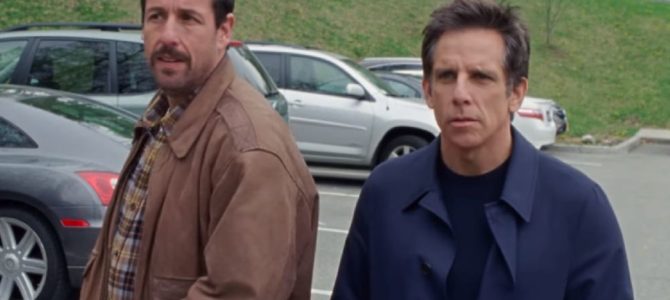
An important rule about New York City to keep in mind is that nobody here is successful. Instead, everyone is either unsuccessful or about to be unsuccessful. I imagine there are places in the country one can sit on a pile of money or accomplishment, loosen the belt, and breathe the quiet air of self-satisfaction. Gotham is not one of them. Noah Baumbach’s entertaining film “The Meyerowitz Stories” explores this nature of success: its promise, but more importantly its limitations.
Every member of the Meyerowitz family is extremely successful. The father and stepmother, Harold (Dustin Hoffman) and Maureen (Emma Thompson), own a house—yes an entire house—in downtown Manhattan as well as a country home. Harold, a sculptor and former professor, is the bearded progenitor of a family that is not just well off, but also members of New York City’s ruling and creative class.
The three Meyerowitz children also have hallmarks of successful lives. Danny (Adam Sandler), though mocked by his father for having been a househusband and facing a divorce, has also raised a charming and bright daughter, Eliza (Grace Van Patten), who is on her way to college. Jean (Elizabeth Marvel) has a productive job at a major corporation. Matthew (Ben Stiller) left New York for Los Angeles, where his wealth management firm is thriving.
But what all of these characters, except the young, hopeful Eliza, have in common beyond their success is a deep-seated belief that they are, in fact, failures. Baumbach is dipping his pen in the early 1980s inkwell of Woody Allen, evoking films like “Interiors” and “Hannah and Her Sisters.” This is not the generic familial dysfunction of wealthy people with too much time and money on their hands. It is uniquely New York. It is the seething despair and jealousy that comes from living in a cauldron where relevance is the coin of the realm.
The Effects of a Father
Running through the film is a subplot involving a sculpture of Harold’s that the Whitney Museum of American Art, home of the country’s most prestigious biennial, purchased decades ago and now can’t seem to locate. The tragedy of this lost heyday haunts the entire family. This is so primarily because Harold, so desperate to reclaim past glory, can speak of nothing but himself, and fanciful hints of his imminent return to prominence. Not only is he demonstrably fooling himself, he is unable to listen to his children, all of whom want little more than some paternal attention and affection.
In bringing to life this comic tragedy of souls lost to the city, Baumbach is aptly aided by some incredible actors firing on all cylinders. Hoffman is brilliant and infuriating, walking a knife-edge between charm and reckless self-deception. Perhaps nothing in the story screams sad New York elite so much as his cringe-worthy insistence that he had a real moment in saying “Hi” to Sigourney Weaver at a rival’s MoMa opening.
As Hoffman’s counterpoint, Sandler’s Danny is sincere and heartwarming, proving again the old adage that stand-up comedians tend to make excellent dramatic actors (stand-up is much harder). Look for more directors to take note of this superb performance. His is the character most desperate for a father’s love. The one year that he lived in his father’s house as a child is at once a blissful memory and a horrible reminder of what might have been. It is no surprise that, having been denied a father, Danny spends his entire adult life being a father, first and foremost.
Not to be lost in the shuffle is Van Patten’s excellent turn as Eliza. Bubbly and smart, she exudes all the promise of a pretty, well-spoken girl off to a fancy Northeastern liberal arts college to make pornography in film class. But is she destined to break the chain of misery, or will she, too, eventually be broken down by the burden of her dreams?
Making Space for a Smaller Tale
Baumbach’s writing is, for the most part, taut, pointed, and entertaining. An unfortunate exception is some ugly exposition in the first 20 minutes. Too many characters say things like, “Remember when (thing really important to the plot) happened?” It’s extremely lazy, and one gets the feeling that he was eager to ditch the early moments of the film and dive into its meat.
Once he gets there, he finds a groove and the ball starts rolling downhill smoothly and with excellent pace. Particularly nice is the way he weaves in repetitions of old family expressions, as well as small references to the personal art made by characters like Joan and Danny.
“The Meyerowitz Stories” is another reminder of how the new entertainment world of tech companies and streaming allows for niche work to be produced. It’s in many ways a quiet and airy piece; it lacks the weight, though not the star power, to sustain a major studio rollout. This, on the whole, is a good thing for movies, even if it financially harms the old mega Cineplex model.
Inside this space for smaller tales, “The Meyerowitz Stories” provides lessons and warnings for parents, especially those in the rat races of major metropolitan areas. Survival in such cities often feels like it requires a selfish inward focus. It is all too easy to allow the real demands of that kind of daily life to overwhelm and stand in the way of family time and connections.
It doesn’t mean that love dissipates. It remains strong and elemental, but it struggles to find expression. Seeing glimpses of oneself in any of these characters—and I suspect many will—is a jarring sensation. But that is what good art and good film do: they warn us while drawing into the world of the story. On this score, “The Meyerowitz Stories” is a great success. It is a deeply felt and charming film that rewards our quiet attention.









